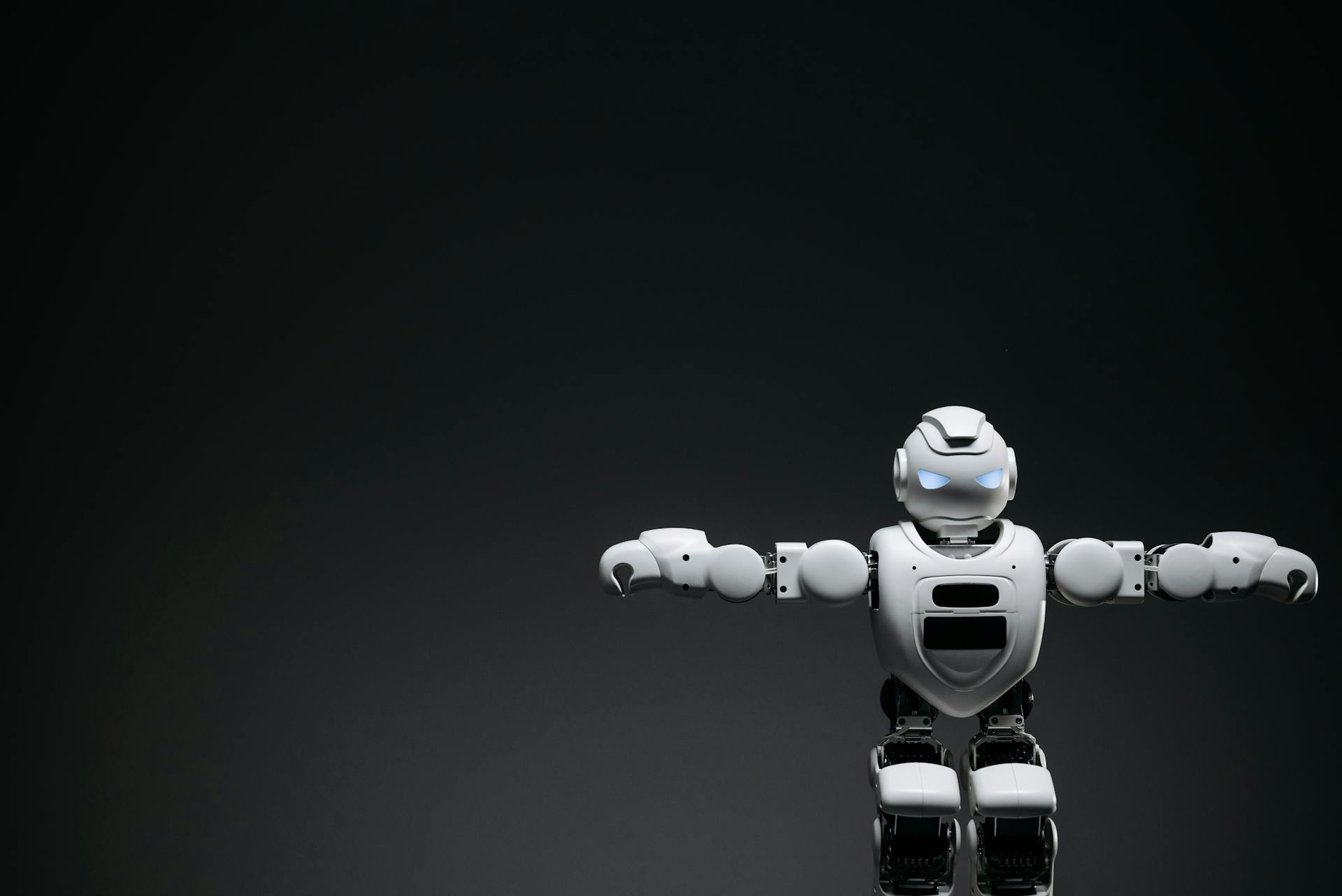
Becoming an Artificial Intelligence Software Engineer requires a strong foundation in computer science and mathematics.
To start, you'll need to learn programming languages such as Python, Java, and C++. These languages are widely used in AI development and are essential for building and training AI models.
A bachelor's degree in computer science or a related field is typically required to become an AI software engineer. Coursework should include classes in machine learning, data structures, and algorithms.
You can also gain practical experience by participating in coding competitions, hackathons, or contributing to open-source AI projects.
What is a Developer?
A developer is someone who designs, develops, and implements software, including AI models and systems. They use programming skills to create software that can learn from data and make decisions or predictions.
Their role involves a lot of research, innovation, and problem-solving, and they need to stay up-to-date with the latest AI research and understand complex mathematical concepts.
AI developers create software that can do amazing things, such as autonomous vehicles that can navigate city streets on their own, and large language models that can generate human-like text and even beat humans on some cognitive tasks.
To become an AI developer, you'll need to master specific skills, including programming, algorithms, and data structures.
Here are the main skills you'll need to become an AI developer:
- Programming skills
- Algorithms
- Data structures
Skills and Knowledge
To become a successful artificial intelligence software engineer, you need a strong foundation in software engineering principles. This includes familiarity with software architecture, system integration, and version control systems.
Understanding cloud computing and being able to work with platforms like AWS, Google Cloud, or Microsoft Azure is also essential. Proficiency in testing methodologies, including unit tests, integration testing, and automated testing tools, ensures that the AI systems you create are robust and reliable.
Python is the most popular language for AI development due to its simplicity and readability, and the availability of numerous libraries for AI and machine learning. Other languages used in AI development include R, Java, and C++.
On a similar theme: Generative Ai Testing
Knowledge of computer science fundamentals, such as algorithms and data structures, is crucial for designing efficient AI models. Understanding statistical concepts, like probability and statistical inference, can help you evaluate the behavior and performance of AI models.
Data visualization is a vital skill for AI developers, providing valuable insights into the data and aiding in the understanding and interpretation of the results of AI models.
Education and Training
Pursuing formal education is a crucial step in becoming an AI developer. A bachelor's degree in computer science, information technology, or a related discipline is a good starting point.
These courses provide a solid foundation in algorithms, data structures, mathematics, and programming. A bachelor's degree in computer science can take four years to complete.
Many AI developers also hold a master's degree or a doctorate in a related field. This advanced education can provide a deep understanding of the theoretical aspects of AI.
Specialized courses in AI, machine learning, and data science can be invaluable in designing and implementing effective AI models. These courses can be found at many universities and online platforms.
Embarking on the path to becoming an AI engineer typically begins with obtaining a Bachelor's degree in a relevant discipline. This degree program can take four years to complete.
The curriculum for these degree programs often includes courses in machine learning, deep learning, artificial intelligence, and natural language processing. These courses provide the foundation needed for a career in AI engineering.
Given the rapidly evolving landscape of AI and machine learning, many aspiring AI engineers also choose to pursue a Master's degree specializing in artificial intelligence. This provides more in-depth knowledge and specialization in the field.
IU International University of Applied Sciences offers 8 different MA degrees in artificial intelligence specialisations. These specialisations cover a range of topics, from FinTech to the car industry.
For another approach, see: Artificial Intelligence and the Future of Teaching and Learning
Career Development
As an AI software engineer, career development is crucial to stay ahead in the field. The demand for AI engineers is on the rise, with a 23% increase in jobs expected over the next decade, almost 5 times as much as the overall industry growth rate.
To break into the field, you'll need to acquire essential skills, including expertise in machine learning, coding, and problem-solving abilities. This can be achieved by earning a relevant degree, gaining experience, and continuously updating your skills. You can also pursue specialized education and practical projects to build a professional AI engineering portfolio.
Continuous learning is key to staying updated on the latest advancements in AI. This can be done through frequent self-study, online courses, attending seminars, and participating in relevant workshops. AI developers should also stay updated with the latest developments in the field by reading research papers, attending conferences and seminars, participating in online forums and communities, and taking online courses.
Take a look at this: Ai Courses for Software Engineers
The salary potential for AI engineers is also a major draw, with the average salary in the United States currently sitting at around $120,000 per year, and some companies offering up to $250,000 per year.
Here's a list of some of the key skills and qualifications needed to become an AI software engineer:
- Expertise in machine learning
- Coding skills
- Problem-solving abilities
- Relevant degree
- Experience in AI engineering
- Continuous learning
Remember, becoming an AI software engineer requires a combination of academic knowledge, hands-on experience, and continuous learning. With the right skills and qualifications, you can succeed in this exciting and rewarding field.
Artificial Intelligence and Machine Learning
As an artificial intelligence software engineer, you'll need to have a solid foundation in machine learning and AI techniques. This includes understanding supervised learning, unsupervised learning, reinforcement learning, and deep learning, as well as being able to design, implement, and optimize various machine learning algorithms.
To become proficient in machine learning, you'll need to master concepts such as linear regression, decision trees, and support vector machines, as well as supervised learning, unsupervised learning, and reinforcement learning. Deep learning is a crucial part of this, and you'll need to understand concepts like backpropagation, gradient descent, and overfitting to design effective deep learning models.
If this caught your attention, see: Ai Software Design
Some popular frameworks for AI development include TensorFlow, PyTorch, and Keras, which provide functionalities for developing and training various types of neural networks. You'll also need to be familiar with tools and libraries for data manipulation and analysis, such as NumPy, Pandas, and Scikit-learn.
In addition to these technical skills, you'll also need to have strong skills in data science and analytics, including knowledge of data preprocessing techniques, statistical concepts, and data visualization tools. This will help you to understand the behavior of AI models and evaluate their performance.
Data Science and Analytics Development
Data Science and Analytics Development is a crucial aspect of Artificial Intelligence and Machine Learning. AI developers should have a strong foundation in data science and analytics, including knowledge of data preprocessing techniques, statistical concepts, and data visualization tools.
Data preprocessing is a critical step in AI development, involving data cleaning, normalization, and feature extraction. AI developers should be proficient in using tools like Pandas, NumPy, and Matplotlib for data manipulation and visualization.
Check this out: Ai for Software Developers
Statistical concepts, such as probability, statistical inference, and hypothesis testing, are essential for understanding the behavior of AI models and evaluating their performance. AI developers should have a good grasp of these concepts to make informed decisions about their models.
Data visualization is another key aspect of data science and analytics, providing valuable insights into the data and helping to understand and interpret the results of AI models. AI developers should be familiar with tools like Matplotlib and Seaborn for data visualization.
Here are some key areas of focus for data science and analytics development:
- Data preprocessing: data cleaning, normalization, and feature extraction
- Statistical concepts: probability, statistical inference, and hypothesis testing
- Data visualization: using tools like Matplotlib and Seaborn to understand and interpret data
By mastering these areas, AI developers can create more accurate and reliable AI models that can drive business value and improve decision-making.
Ethical and Social Implications
As AI adoption rises, organizations must weigh their ethical and social obligations.
AI has sweeping effects across industries, and its impact is not limited to job displacement.
Companies should expect to expand the training of their technical teams to issues of societal impact, or bring in consulting experts to help advise and guide developers.
Expecting an army of talented technicians to see and be on the front lines of historical ethical considerations is unrealistic, especially for self-taught programmers and developers.
AI has the potential to ingrain biases into its models, with developers risking building assumptions and prejudices into an AI's core design.
Prioritizing fairness, transparency, and accountability in AI systems is crucial to mitigate this risk.
Coders are not trained to deal with ethical concerns, which is a major issue in the industry.
Tools and Platforms
As an AI software engineer, you'll need to be proficient in using various frameworks and tools to develop and improve AI models. TensorFlow, PyTorch, and Keras are popular frameworks for AI development.
These frameworks provide functionalities for developing and training various types of neural networks. Knowledge of NumPy, Pandas, and Scikit-learn can be beneficial for data manipulation and analysis.
You don't have to build all your own tools from scratch. There have been significant investments in fundamental research and the production of practical tools and libraries that can be licensed and included in projects.
Here are some key leaders in the tools and platforms sector:
- Google Vertex AI: A unified platform on Google Cloud offering comprehensive tools and services for building, deploying, and scaling AI and machine learning models.
- Amazon AWS SageMaker: A fully managed service that helps developers build, train, and deploy machine learning models.
- Microsoft Azure Machine Learning: A set of cloud services that use machine learning tools to train and deploy models faster.
Cloud-based AI development platforms offer cloud infrastructure to develop, train, and deploy machine learning models at scale.
Best Practices and Challenges
As an artificial intelligence software engineer, it's essential to be aware of the challenges and limitations that come with this field.
Technological complexity issues are a significant concern, with three main areas of concern:
These areas of concern can hinder progress and make it difficult to implement AI in software engineering effectively.
Incorporating best practices can help mitigate these challenges, such as understanding the limitations of AI and being aware of potential issues.
Code Summarization and Documentation
Code summarization and documentation are crucial steps in the software development process. AI can automate this process, condensing long pieces of text into shorter passages that are easier to parse and adjust.
Manual tests are still necessary to ensure code quality, but AI can help by conducting A/B testing on two versions of a program to find the best solution.
AI can generate documentation for programmers, which helps teams find the root cause of issues or inconsistencies in their work. This saves time and effort in the long run.
Maintaining the Human Element
Programmers will continue to create most software for the foreseeable future, despite the addition of AI in the development environment.
Reducing time and tedium can help developers stay sharp, and AIs can also monitor team performance to prevent burnout.
AIs can provide managers with notifications if a team member is over-utilized, over-extended, or heading to burnout.
AIs can help reallocate team assignments so that each member is working to their strengths.
AIs can also assist with planning and resource allocation.
Challenges and Limitations
As AI becomes more integrated into software engineering, we face significant challenges and limitations.
Increased complexity is a major issue, making it harder for teams to understand how the code works.
The more we rely on AI-generated code, the less we'll know about its inner workings, making maintenance a significant challenge.
Expecting AI to maintain its own software is a trap, as when the AI's code breaks, it's up to humans to figure out what went wrong and fix it.
Ethical Concerns
Coders aren't trained to deal with ethical concerns, and that's a problem.
Societal impact is not part of most computer science curricula, so expecting tech teams to see historical ethical considerations is unrealistic.
Companies using AI should either expand their technical teams' training to include issues of societal impact or bring in consulting experts to advise and guide developers.
AI has sweeping effects across industries, and organizations must weigh their ethical and social obligations.
Job displacement is a risk, but it's just the tip of the iceberg - AI can also ingrain biases into its models.
Developers risk building assumptions and prejudices into an AI's core design, so fairness, transparency, and accountability in AI systems are crucial.
Future and Impact
The future of artificial intelligence in software engineering is exciting and full of possibilities. As we look ahead, several key trends and predictions emerge.
AI-first development is on the rise, with machine learning at the core of projects. This shift will bring about new efficiencies, but also new challenges.
On a similar theme: New Ai Software Engineer
Self-adapting software that evolves in real time based on user needs is a reality we're moving towards. This means that software will be able to adapt and change as user needs change.
Collaborative AI that partners with developers, understanding context and team dynamics, is becoming more prevalent. This collaboration will lead to more efficient and effective software development.
A focus on ethical and responsible AI that emphasizes transparency and fairness is crucial. This means that AI systems must be designed to be transparent, explainable, and fair.
AI-powered cybersecurity that proactively detects and addresses threats is a growing area of focus. This will help protect software systems from cyber threats and ensure the security of user data.
Custom AI models catering to specific needs will become more common. This will allow developers to create AI models that are tailored to their specific needs and use cases.
Continuous learning for developers is essential, given AI's evolving nature. This means that developers will need to stay up-to-date with the latest AI technologies and techniques.
As AI becomes more prevalent in software engineering, we can expect to see code and solutions written primarily by AIs that are opaque to human developers. This raises important questions about the role of human developers in the software development process.
A different take: Is Ai Going to Replace Software Engineers
Here are some key areas where AI will impact the developer experience:
- Design to platform thinking: Developers will focus on how platforms function in goal-oriented design.
- AI-assisted user story drafting: AI will help draft user stories, acceptance criteria, and requirements.
- Basic UI design: AI will assist with basic UI design, leaving more complex interactive design elements to human teams.
- Continuous delivery: AI will deliver true continuous delivery, allowing agile teams to write high volumes of code and draft PRs for teams to review.
- Testing: Testing will become a higher priority, with teams needing to build the architecture that tests AI-produced code from every angle.
Frequently Asked Questions
What is AI engineer's salary?
The average salary for an Artificial Intelligence Engineer is ₹6,00,000 per year, with an estimated total pay of ₹7,25,000 per year. Discover more about AI engineer salaries and career prospects.
Sources
- https://www.run.ai/guides/generative-ai/ai-developers
- https://www.zdnet.com/article/implementing-ai-into-software-engineering-heres-everything-you-need-to-know/
- https://www.iu.org/blog/career-paths/how-to-become-an-ai-engineer/
- https://www.codecademy.com/learn/paths/machine-learning-engineer
- https://www.pluralsight.com/resources/blog/business-and-leadership/AI-in-software-development
Featured Images: pexels.com


